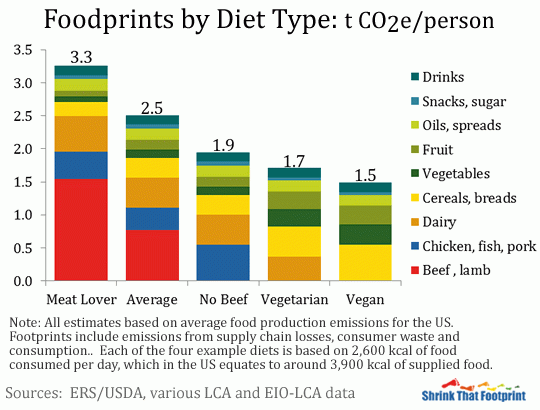Research has found that keto and paleo diets have a higher carbon footprint
Researchers from Tulane University have found that trendy diets like keto and paleo have a higher carbon footprint than other options like a vegan or vegetarian one. The study was published March 1 in the American Journal of Clinical Nutrition.
Researchers took information from the National Health and Nutrition Examination Survey (NHANES).
Donald “Diego” Rose, PhD, RD, the nutrition program director at Tulane University School of Public Health and Tropical Medicine, one of the authors of the study, says that the environmental impact of a person’s chosen diet is often far lower on their list of priorities than perhaps it should be.
“I think in general, most people, when they choose foods to eat, they don’t think about the planet.”
That vantage point is something that Ashley Kitchens, MPH, RDN, founder of Plant Centered Nutrition, has also found in her practice.
“I’ve worked with hundreds of clients at this point and I would say a very, very small sample size actually goes or wants to become more plant-based based on the ecological impacts. I am seeing it a little bit more. but I feel like we’re still kind of catching up to making note of food and its impact on the environment.”
The study used the Healthy Eating Index (HEI) and the Alternate Healthy Eating Index to identify the relative value of each diet from a nutrition perspective. The information gleaned was also sorted into six categories: vegan, vegetarian, pescatarian, paleo, keto, and omnivore—a catch-all for all other diets.
The study notes how culture, race, age, education, and income level can shape nutritional data.
Matching diets to greenhouse gas emissions meant looking at average daily emissions (measuring in kilograms of carbon dioxide) per 1,000 kilocalories. This was done using a database that the team had already developed for previous research.
The results came with two surprises for the research team.
One, that the diet that scored highest from a nutritional perspective, a pescatarian one, didn’t also score the highest from a greenhouse gas emissions perspective. The other was just how much higher emissions were for keto as compared to others.
“We kind of figured that keto diets would be a little higher,” Rose says, “ I didn’t expect them to be so high. I didn’t expect keto, it’s like four times what the vegan one was.”
It’s also important to look at the limitations of the study, including the fact that the main measure of ecological impact was carbon footprint and wasn’t accompanied by water usage data or pollution data. Rose adds that the way the team chose to quantify nutrition could be done many other ways and be broadened to include factors like calcium intake.
Kate Regan, RDN, founder at Wholesome Chick Nutrition, says that this study will help her and her colleagues broach the subject with clients as they try to figure out what is driving them to make these nutritional changes..
“I think it’s important to find what is motivating for each individual. So, if we know that a plant-based, plant-forward diet is healthy for the client and that client’s really interested in reducing their environmental impact, that can be a huge motivating factor.”
From a practicing nutritionist point of view, Kitchens says that she wants to see more conversations in the field with both clients and colleagues about the varied ways our food choices impact the environment.
“I think there could be more emphasis on the foods that we’re eating, and just really the strain that it’s putting on our environment when it comes to biodiversity or deforestation, or pollution and plastic pollution, those types of things.”
When people come to her looking to become more plant-based, Kitchens says that she finds it’s really important to make it clear to clients that changing their approach to food doesn’t have to be an all or nothing proposition.
“Because if I tell them,’ Okay, you’re working with me now, you can’t eat meat, you can’t eat dairy, you can’t have eggs, and then] it’s like, ‘Okay, well, this is just another diet, like all the other diets that I’ve done.’ And we’re just trying not to repeat that cycle.”
Regan says that the most common way food’s environmental impacts feed into her conversation with clients is through discussions about food waste.
“We do talk a lot about how to minimize that and how to grocery shop and meal plan to reduce the amount of food that you are wasting. Not only for environmental reasons, but also for financial reasons, too.”
Still, as research in the area grows—moving away from previous models that relied on generalizations about entire countries or regions—Rose is still keenly aware of the realities of the public’s general relationship to food.
“They’re more likely to think about waistlines than footprints.”
Reposted from: https://www.healthline.com/health-news/how-being-on-keto-or-paleo-can-affect-the-planet


.png)



.png)
.png)



Comments